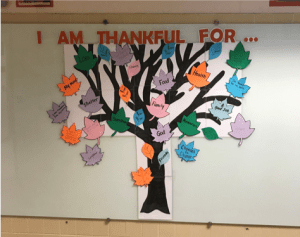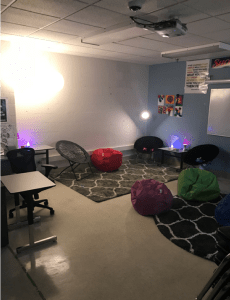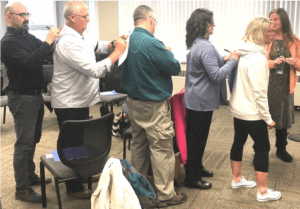Train the Trainer, Transform a School: A Case Study of the Vel R. Phillips School
The Vel R. Phillips School is unlike any other school. As a part of the Vel R. Phillips Juvenile Justice Center, its students are placed in secure detention. Many are awaiting court decisions that could severely impact their lives.
Roughly half of the student population has a learning or behavioral disability. Most are only there temporarily, and students attend classes with their living groups instead of grade levels.

But, according to special education teacher Bekki Crowley and school social worker Amandla Daniels, the Vel R. Phillips School does have a lot in common with every other school. There are class periods, curriculum and learning objectives and the teachers and students show up every day to put in the work.
Teachers have incorporated more lessons that allow for student voice, and all general population students take a social-emotional learning class.
After attending SaintA’s Train the Trainer program, Crowley and Daniels saw opportunity for transformation. Two years in, the results are remarkable.
The Challenge
At this school, Daniels says, “Students’ trauma is right in your face.” Yet there wasn’t much talk about trauma, its prevalence or its impact on students – or staff, for that matter – when she first started this job. The lack of trauma awareness was not just impacting students.
Crowley and Daniels describe a culture of burnout among staff. “This was not a place I wanted to come every day, and it was apparent that this culture was going to rub off on the students,” says Crowley.
Crowley’s observations were confirmed by the data. In the 2016-17 school year, staff were absent an average of 30.1 days out of the year. The same year, students were removed from rooms 750 times and there were 83 classroom altercations.
Crowley, Daniels and others were looking for solutions.
The Strategy
In January of 2018, Crowley and Daniels were selected by administration to attend Train the Trainer: Seven Essential Ingredients of Trauma Sensitive Schools with Sara Daniel, Senior Trainer and Vice President of Educational Services at SaintA.
In two years, classroom altercations dropped by 75%
This training takes a nontraditional approach, providing participants with individualized support so they can most effectively turn their learning into action in their workplaces. After each session, Crowley and Daniels were able to use Daniel as their resource.
Training Followed by Coaching
“We were able to go into deeper discussions on how these concepts would apply to their unique school setting,” says Daniel.
Together, the teachers and their TSS coach strategized to bring what they learned back to their colleagues and students. “Sara would help us navigate situations, even how to say certain things,” says Daniels. “She helped us see relevance in the concepts for our own context.”
They determined that the main focus would be on staff awareness, perspective shift, and creating a common understanding of the challenges that the students face. This meant they would need a universally supportive environment.
Implementation
In January of 2018, Crowley and Daniels were selected by administration to attend Train the Trainer: Seven Essential IAfter deliberating with Daniel, Crowley and Daniels decided to begin with Caregiver Capacity, knowing that vicarious trauma, compassion fatigue, and burnout had taken a hold of school culture. “We started with the adults taking care of themselves so we could continue to do this work,” says Crowley.
The average number of staff absences fell from 30 days per year to 12
Crowley and Daniels report that their school administration was supportive throughout this effort, promoting their work as an essential part of creating a positive school-wide culture.
Early tactics included encouraging staff to remember why they chose their jobs, and creating opportunities to increase vulnerability and trust among staff members. “Really emphasizing that each one of us are affected by trauma, just in different ways, helped us get some wins with the team and keep going on with the training,” says Daniels.
Perspective Shift Takes Time
They were then able to move on to Perspective Shift, which involved changing the mindset of staff in order to create a ripple effect of change with students. “Change is hard,” says Daniels. “In the beginning, there was push back because so many staff members have been doing this for so long.”
Learning how to model behavior, role play, and be vulnerable first all helped the teachers forge better relationships with the staff they now had the opportunity to teach. “We needed to show that another way of doing something can work,” says Daniels.
Along with modeling, Crowley and Daniels point to the smaller conversations among staff as the drivers of change in the early stages of the training, and still today. “The changes are the result of a lot of small, daily, ongoing, constant, sometimes frustrating, sometimes easier conversations,” says Crowley.
Over time, the ideas gained traction and led to concrete changes.
outcomes
In the two years since their first Train the Trainer session, Vel R. Phillips School has witnessed clear and positive outcomes. Daniel notes that schools who implement 7ei with patience and determination can create positive educational climates.
“Schools like this, who take the time to operationalize trauma sensitive ideas, often develop a culture where students and staff are better regulated and more likely to develop positive relationships,” she says. “There is also an increased sense of having reason to be and that’s important for all of us.”
Noticeable Improvements
The byproducts of this culture can result in a number of positive outcomes, such as fewer behavioral and disciplinary incidents, reduced staff turnover, and better student engagement overall.
Crowley and Daniels first point to student behavior. “They might not know exactly what has changed, but they’ll come out and say, ‘No, we can’t fight in this class.’” This shift in student behavior is captured in data. In the 2018-19 school year, there were only 21 classroom altercations, a quarter of the number of altercations in 2016-17.
Small Changes. Big Difference.
According to Crowley and Daniels, the mindset of teachers has changed from asking “What’s wrong with you?” to “What’s happened to you?” Staff members now utilize relationship-based tactics, rebuilding trust school-wide.
They check in with one another. They make birthday cards for students. They step into the hallway with a student to have a conversation instead of resorting to room removal. In fact, the number of room removals in the 2018-19 school year was less than half of the number in the 2016-17 school year.

Staff members are responding to behaviors differently, too. “In 2016-17, behavior was a three-strikes-you’re-out kind of policy,” says Crowley. “This culture shift is a huge win for us.”
The average number of staff absent days has fallen from 30 to 12 in two years. Crowley and Daniels attribute this to revitalization to caregiver capacity and the willingness of staff members to be vulnerable and build relationships. “People are now having discussions about how things bother them, and reminding each other to take care of themselves,” says Crowley. “We’re kind of like a big family now.”
“We have each other’s backs,” adds Daniels. “And we know that now.”
Ongoing Dedication
Change is ongoing, but Crowley and Daniels feel strong momentum. With a long road of work ahead, Crowley and Daniels maintain the belief that “If it can happen here, it can happen anywhere.” Despite its unique limitations, the Vel R. Phillips School has seen–and is continuing to see–change happen.
“We were still able to find creative ways to change our culture, to be trauma sensitive, with all these different constraints,” says Daniels. “If we can find that change and create the culture that we have, anyone can.”





